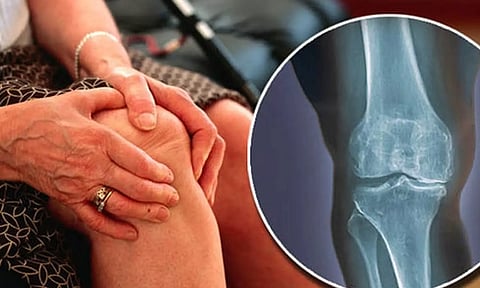

HYDERABAD: A swelling caused in one or more joints that worsens with age, arthritis is a musculoskeletal condition that causes the body to attack its own tissues in the joints. Every year, World Arthritis Day is celebrated on October 12 to encourage people to take action on improving lifestyles affected due to this disease.
The theme of this year is "It’s in your hands, take action", designed to inspire individuals with arthritis, along with caregivers and families to help realize their responsibility towards protecting their joint health.
Celebrated following a year-long campaign, this day holds significance as it aims to increase awareness about arthritis and musculoskeletal conditions.
World Arthritis Day encourages advocacy efforts to improve healthcare services, early diagnosis and find proper treatment for the disease.
Doctors say it is crucial to have the right healthcare facilities that enable patients to have regular check-ups and increase their awareness about this condition. In the 21st century there are as many options available for targeted and effective treatments.
These include biologics and immunosuppressive drugs, further advancements in genetics and genomics, which have also deepened the knowledge of medical researchers who understand the genetic factors that cause arthritis.
In India, the symptoms of arthritis can be managed by painkillers, non-steroidal inflammatory drugs and anti-rheumatic drugs.
For patients who are in advanced stages of arthritis, common treatments are joint surgery, ultrasound, and joint injections.
According to Dr. Kishore B Reddy, HOD - Orthopedics & Orthopedics Oncology, Amor Hospital, Hyderabad: "The symptoms of arthritis commonly include swelling, pain, reduced range of motion and stiffness which is caused in legs, hands, lower back, hips and knees. This can occur to older as well as younger populations. Arthritis affects 15 per cent of the population in India, i.e, 210 million, contributing to 22 per cent- 39 per cent share to the global numbers."
"Osteoarthritis is the second most common rheumatologic problem and it is the frequent joint disease in India. Although arthritis occurs in the older population above 50 years of age, this disease is also experienced by people in their 30s. Sometimes, rheumatoid arthritis can be seen in children aged 5. When people experience symptoms of arthritis, they need to get their diagnosis soon as treatment for each type of arthritis is different and patients would require different medications."
Dr S.V.L. Narasimha Reddy, Consultant Orthopedic Surgeon, SLG Hospital says arthritis is a broad term and has two types.
The first one relates to inflammation like rheumatoid arthritis, spondylitis and lupus which is degenerative.
The second is osteoarthritis, which is a common type of arthritis affecting millions of people around the world.
"Some people even experience morning stiffness, which means their hands don’t work immediately. People also experience swelling in their mouth, hair loss, rashes on their face due to the sun. They experience dryness in the mouth and eyes as well. It is advised to not overuse pills. There are biological injections now being used for arthritis, this is an advanced treatment to help joints get better, the treatment should be done within 6 months of diagnosis. Arthritis is also a reversible disease, which means if there is the right treatment at the right time."
Dr. Sujit K. Kaparthy, Consultant – Orthopaedics, Century Hospital, said: "If a patient has been recently diagnosed with arthritis, they may not be sure if it spreads to other body parts. Arthritis can spread to other body parts and become worse, spreading from affected areas. A mild flare of arthritis may last a few days and go away on its own. Whereas a severe flare of arthritis can last longer, it is also the first sign of rheumatoid arthritis.
"Autoimmune diseases are usually caused when the body mistakenly attacks healthy cells, tissues. In such cases, osteoarthritis remains stable for years while others spread rapidly and destroy the cartilage in the space of a few months. Staying at a healthy weight, controlling your blood sugar, exercise, stretching, avoiding smoking and following a routine are some preventive care methods to stop the attack of arthritis."
Lifestyle factors such as food contribute to inflammation and increase the symptoms of arthritis in the human body.
Consumption of sweets, dairy, fatty foods, carbohydrates, gluten, and additives can increase the symptoms of arthritis.
With a personalised treatment plan, arthritis can be properly diagnosed and one can prevent permanent joint pain.